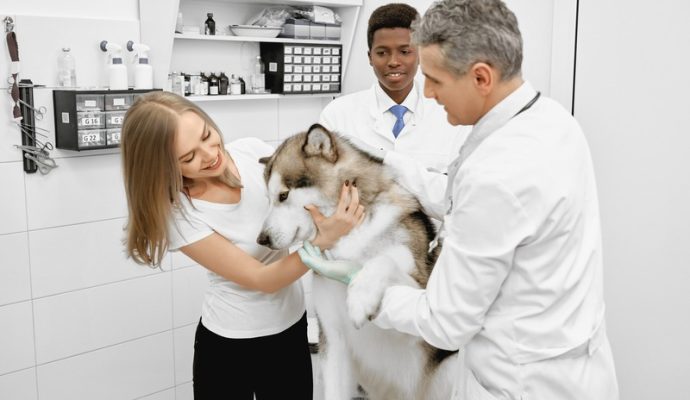Wellness exams are the checkpoints of your dog’s health journey, serving as both a time for routine assessment and an opportunity for early detection of potential health issues. This article cracks open the door to understanding why regular health checks are essential, what they entail, and when they should occur.
Diving into the particulars of dog wellness exams, we’ll make sure you have the information to keep your furry friend on the path to a long, healthy life.
What Is a Wellness Exam?
Imagine a wellness exam as a top-to-tail inspection where veterinarians look for signs of health and happiness in your canine companion. Unlike sick visits, which address specific concerns or illnesses, wellness exams are preventative touchpoints designed to maintain overall health and preemptively tackle issues.
During one of these visits, you can expect your dog to undergo a physical examination, which might include blood work, vaccinations, and consultations on diet, exercise, and dental care.
Key Indicators for Wellness Exams
Regular wellness exams are an essential component of your dog’s health regime. But how do you know when it’s time for a check-up outside of the normal schedule? Here are some key indicators that it might be time to book a wellness exam for your four-legged friend.
Changes in Behavioral Patterns
- Decrease in Activity: If your usually active dog seems lethargic or less enthusiastic about play or walks, it could be a red flag.
- Increased Anxiety: Sudden anxiety or changes in behavior, like increased aggression, can signal underlying health issues.
- Sleeping Habits: Excessive sleep or difficulty sleeping can both be reasons for concern.
Physical Signs
- Unexpected Weight Loss or Gain: Significant changes in weight without a corresponding change in diet or activity level need to be addressed.
- Unusual Eating or Drinking Habits: Eating less than usual, having difficulty eating, or drinking excessively can all warrant a veterinary visit.
- Changes in Coat: A dull, dry, or excessively oily coat, or one with bald patches, can indicate health problems.
Age-Related Health Monitoring
- Puppies: Young dogs may require more frequent visits to ensure they’re developing properly and keeping up with vaccinations.
- Adult Dogs: Adult dogs should maintain a regular exam schedule, but any deviation from their normal health baseline can be cause for a visit.
- Senior Dogs: Older dogs often need semi-annual exams due to increased health risks associated with aging.
Emerging or Recurring Symptoms
- Gastrointestinal Issues: Symptoms like vomiting, diarrhea, or constipation are common worries that should be checked out.
- Skin Irritations: Persistent scratching, biting, or licking of the skin may indicate allergies or parasites.
- Respiratory Changes: Persistent coughing, wheezing, or difficulty breathing can be signs of serious health conditions.
These indicators can help pet owners determine when to schedule wellness exams outside regular intervals. However, this list is not exhaustive. Always trust your instincts and consult with your vet if you suspect something is off with your dog’s health.
Deciding the Right Age to Begin Wellness Exams
Embarking on the wellness journey starts early for puppies. Setting up a strong foundation with a vet will guide them towards a healthier adult life. Puppies often need several exams throughout their first year to ensure they’re growing well and receiving necessary vaccinations.
Ultimately, your vet will tailor a wellness exam schedule that suits your pup’s developmental needs.
Routine Exams during Your Dog’s Prime
When your dog reaches adulthood, routine exams become the rhythm of their healthcare routine. Often spaced annually, these checkpoints are pivotal for keeping track of any subtle changes that could blossom into health concerns over time.
A balance between lifestyle and wellness exams ensures that active pups or those with specific job roles get the specific care they need.
Emergency Veterinary Care
In between regular wellness exams, emergencies that require immediate attention can crop up. It’s essential to know where the closest emergency animal hospital in Stockton, CA, is located or one in your area to ensure your pet can quickly get the care it needs when facing urgent health issues.
Senior Dogs and Increased Medical Attention
As your dog transitions into its golden years, its health landscape shifts. More frequent wellness exams become key in managing the natural changes and emerging health concerns of an aging pet.
Vets recommend bi-annual check-ups for most seniors, with an eye out for age-related conditions that can affect quality of life.
How Health History Influences Wellness Exam Schedules
- Breed-specific health predispositions influencing exam frequency
- Prior health issues and ongoing conditions shaping the wellness regime
- Customized care strategies for individual dogs
Veterinary Internal Medicine
Beyond preventative care, veterinarians specializing in internal medicine for dogs play a crucial role when wellness exams uncover underlying conditions. These experts dive into diagnosing and managing complex diseases, ensuring your dog gets comprehensive care tailored to their unique health challenges.
Preventive Measures Taken During Wellness Exams
A wellness exam doesn’t only help find issues but also prevent them. A considerable portion of the exam is dedicated to stopping problems before they start. Your vet will update vaccinations, provide parasite control solutions, and discuss ways to maintain your dog’s dental health.
Adequate nutrition and weight control are also hot topics, as these play a huge role in your pet’s overall health.
Responding to the Results of a Wellness Exam
Once your veterinarian has conducted a thorough wellness exam, you’ll discuss any findings and determine the best course of action. This may include follow-up appointments, additional tests, or new dietary and exercise plans.
Staying proactive about your dog’s health helps manage any conditions effectively and maintains your pet’s best possible well-being.
Cat and Dog Wellness Exams
When it comes to preventative health care, there is little difference between cats and dogs. Regular dog wellness exams are as crucial as those for our feline friends, allowing veterinarians to monitor the ongoing health of pets of all stripes (and spots).
Conclusion
As we wrap up our in-depth look at wellness exams, it’s clear that regular veterinary check-ups are the cornerstone of your dog’s health. These visits provide a forum to address any concerns, prevent many potential illnesses, and ensure that your pet lives its best life. Embrace the wellness exam as a powerful tool in your arsenal, safeguarding the well-being of your loyal companion through all their life stages.




